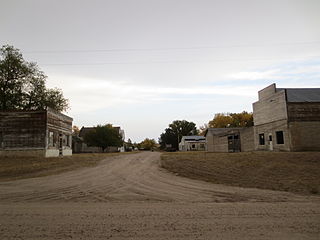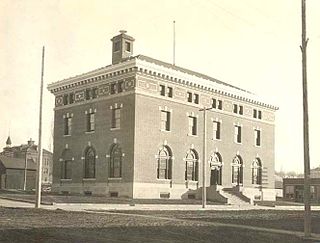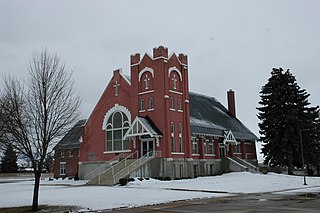
Jobbers Canyon Historic District was a large industrial and warehouse area comprising 24 buildings located in downtown Omaha, Nebraska, US. It was roughly bound by Farnam Street on the north, South Eighth Street on the east, Jackson Street on the south, and South Tenth Street on the west. In 1989, all 24 buildings in Jobbers Canyon were demolished, representing the largest National Register historic district loss to date.

The Cass Park Historic District is a historic district in Midtown Detroit, Michigan, consisting of 25 buildings along the streets of Temple, Ledyard, and 2nd, surrounding Cass Park. It was listed on the National Register of Historic Places in 2005 and designated a city of Detroit historic district in 2016.

The Carreau Block is a historic Classical Revival apartment block at 640-642 Chicopee Street in Chicopee, Massachusetts. It was built in 1912 by Louis Carreau, a locally notable builder of French Canadian extraction, and is his only known surviving building of this type. It was listed on the National Register of Historic Places in 1998.

The Item Building is a historic commercial building at 26 Albion Street in Wakefield, Massachusetts. Built in 1912, the single story brick building serves as the headquarters of The Wakefield Daily Item, Wakefield's main community newspaper, and is a well-kept example of early 20th century commercial architecture.

The Jay Em Historic District comprises the abandoned center of the village of Jay Em, Wyoming. The town was planned and established by Lake Harris between 1912 and 1915 as a service town supporting ranchers in the surrounding area. The place was recognized as a town in 1915 when a post office was established. Tours of the site are available by appointment.

The Michigan Bell and Western Electric Warehouse is a former commercial warehouse building located at 882 Oakman Boulevard in Detroit, Michigan. It was listed on the National Register of Historic Places in 2009. It is now known as the NSO Bell Building.

The Wyandotte Odd Fellows Temple is a community building located at 81 Chestnut Street in Wyandotte, Michigan. It was listed on the National Register of Historic Places in 2009. As of 2010, the building serves as the Wyandotte Arts Center.

The Hailey Masonic Lodge refers to a historic building, which was built in 1937 in Hailey, Idaho. The building was constructed as a meeting hall for Hailey Lodge No. 16, a local chapter of the Freemasons. It was listed on the National Register of Historic Places in 2008.

The Elks Temple in Boise, Idaho was built during 1913-1914 and expanded during 1923–34. It is a four-story, five-bay building in "Italian Palazzo Style". It has served as a clubhouse of the Benevolent and Protective Order of Elks (Elks) organization. It was listed on the National Register of Historic Places in 1978.

The City Hall of Moscow, Idaho, formerly known as the Moscow Post Office and Courthouse and Moscow Federal Building, was built 109 years ago in 1911. Its red brick with ivory terracotta trim reflects Late Victorian and Eclectic architecture.

Salubria Lodge No. 31 is a historic Masonic building located at 85 W. Central Street in Cambridge, Washington County, Idaho, United States. Built in 1922 to replace an earlier meeting hall destroyed by fire, it is a two-story building made of red brick and concrete with a sloped roof over an attic space designed by Watkins & Thompson. Above the entrance are two stained glass windows depicting the emblem of the Masonic order. A metal roof covering has been added to protect the original wooden roof from heavy snowfall.

The Malad Second Ward Tabernacle is a tabernacle and meetinghouse of The Church of Jesus Christ of Latter-day Saints located in Malad City, Idaho. It is significant for its large scale and unorthodox adaptation of architectural styles, as well as its historical importance to Oneida County, which once was among the most populated counties in Idaho. It is, along with six other buildings in Oneida County, listed on the National Register of Historic Places.

The Holy Rosary Church on E. Ninth St. in Idaho Falls, Idaho was built in 1948. It was listed on the National Register of Historic Places in 2002.

The Fayette County Courthouse Historic District is a historic district covering the downtown central business district of Fayette, Alabama. The majority of the buildings in the district were constructed soon after a fire destroyed the town in 1911; the architectural styles reflect common styles in commercial buildings around the Southern United States at the beginning of the 20th century. The district was listed on the National Register of Historic Places in 1976, and the boundaries of the district were increased in 2014.

The First National Bank and Trust Company Building is a historic building located within the Perry Courthouse Square Historic District at the corner of 6th Street and Cedar Street in Perry, Oklahoma. It was built in 1902 and listed on the National Register of Historic Places (NRHP) in 1979.

The Blue Front Rooming House, at 1187 Main St. in Forsyth, Montana, was built in 1912. It was listed on the National Register of Historic Places in 1990.
Francis Charles Woods was a Scottish-born American architect and organ-builder who designed many buildings in Utah and Idaho. Some of his works are listed on the National Register of Historic Places (NRHP), including the Hotel Brigham and the Summit County Courthouse.

The Idaho Republican Building, at 167 W. Bridge St. in Blackfoot, Idaho, was built in 1916. It was listed on the National Register of Historic Places in 1979.

The John Pearce House is a historic house in Albuquerque, New Mexico. It is notable for its architecture and as the only extant house on the Downtown section of Central Avenue, which is otherwise occupied entirely by commercial buildings. The house was built in 1905 by Dr. John F. Pearce, one of the city's first physicians. The contractor, Wallace Hesselden, also built the Henry Mann House the same year. After Pearce moved out of the house in 1933, it was used for various functions including a boarding house and chiropractic clinic. In 1982, the house was renovated and converted to office space. The architect for the renovation was Antoine Predock. The property was added to the New Mexico State Register of Cultural Properties and the National Register of Historic Places in 1980. It is next door to another historic structure, the Skinner Building.



















